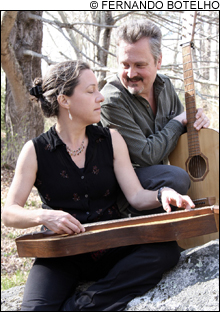
PARTNERS Atwater and Donnelly. |
The earliest people on the planet probably built bonds of community when they pounded on goatskins. Their non-verbal expression of feelings led to chants and then to lyrics that expanded on the melodies and rhythms they were making. That same sense of creative wonder existed among a young group of musicians and music lovers back in 1980, when Joyce Katzberg, Bill Harley, and Debbie Block, Katzberg (Kate) and Snyder (Stephen), and Rick Brooks decided to form a "coffeehouse," by passing the hat in various living rooms.
Harley found their first venue above the Podrat Coin Exchange on Hope Street, and thereafter Stone Soup has moved through a series of churches (with a short but glorious stint at Slater Mill). They now have a wheelchair-accessible home at St. Paul's Episcopal Church, 50 Park Place, in Pawtucket. And this weekend (January 8 at 8 pm, 401.921.5115, stonesoupcoffeehouse.com), a double bill with Meg Hutchinson and Heather Maloney will kick off the second half of their 30th anniversary season, as the pair add their melodies and musings to the three decades of musicmaking.
There have been many thrilling moments at Stone Soup over the years: Greg Brown's bluesy voice singing about his grandma's home-canned goodies ("Summer In a Jar"); Patty Larkin's Carmen Miranda-esque delivery of "At the Mall"; Cheryl Wheeler and Christine Lavin's story-songs that made us laugh till our stomachs hurt; and ditto for Bill Harley's stories and Katzberg and Snyder originals.
Harley calls Stone Soup his "musical home," a place where he tried out new material and recorded a live album in 2002. Kate Katzberg takes credit for the name because she had read the folktale about "stone soup," when a group of villagers tell some soldiers that all they have is a stone for their soup. Gradually, as each villager contributes another ingredient to the soup, it becomes quite tasty, stone and all.
Lifetime activist and songwriter Joyce Katzberg traces Stone Soup's origins back to an anti-nuclear rally at Seabrook, New Hampshire, in 1978, where she heard about a conference on "songs of freedom and struggle." Harley and Snyder attended the event in the spring of 1980 and talked with Pete Seeger about forming a Providence area venue to support political songs — and the rest is Stone Soup history.
Writer and activist Richard Walton joined the organization as president when it was incorporated in 1985, and he has served as its venerable host and spokesperson for a good portion of the intervening decades. He remembers Pete Seeger and Tao Rodriguez Seeger playing at the Gloria Dei Church, as well as a wedding party showing up there for a Dougie MacLean concert, still in tux and gown.
"But I don't think anyone has moved me as much as Rosalie Sorrels," he recalls, "with that worn, weathered voice and those beautiful songs of one who has survived."
Sorrels will make another appearance this season (April 9), and she remains a favorite Stone Soup memory, as well as a role model, for musician Aubrey Atwater. More than 20 years ago, Atwater, a recent Brown grad, and Elwood Donnelly, a postal worker with two small sons, met at Stone Soup as volunteers. They started moving "closer and closer on the big church bench at the rear of the hall," in Walton's words, eventually forming a musical and marital partnership and outgrowing the Stone Soup venue to become a well-known duo on the national folk scene.